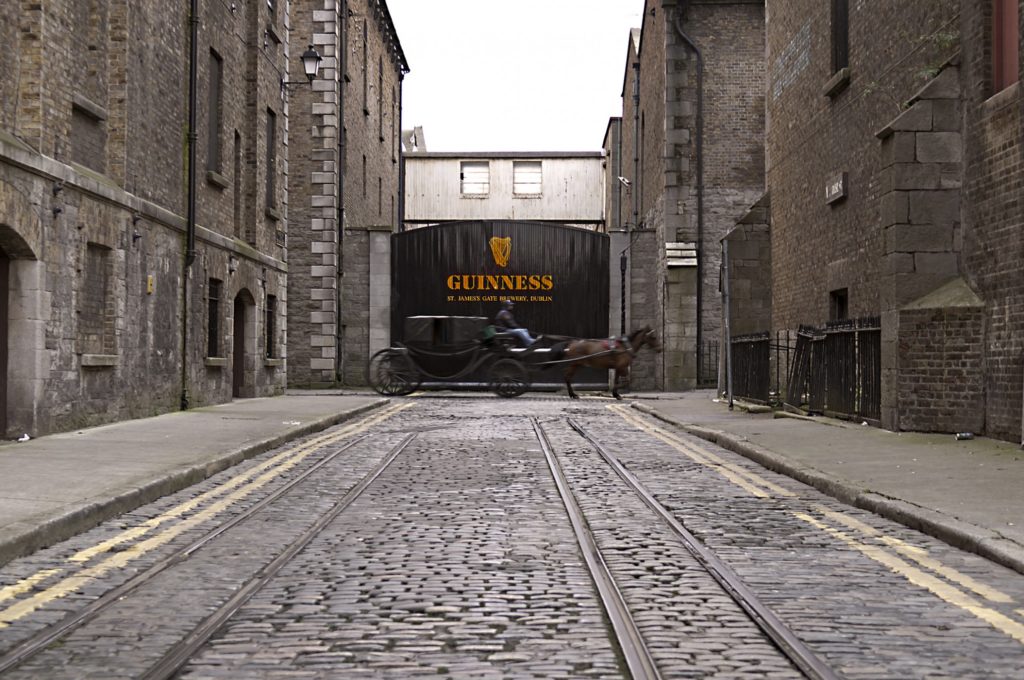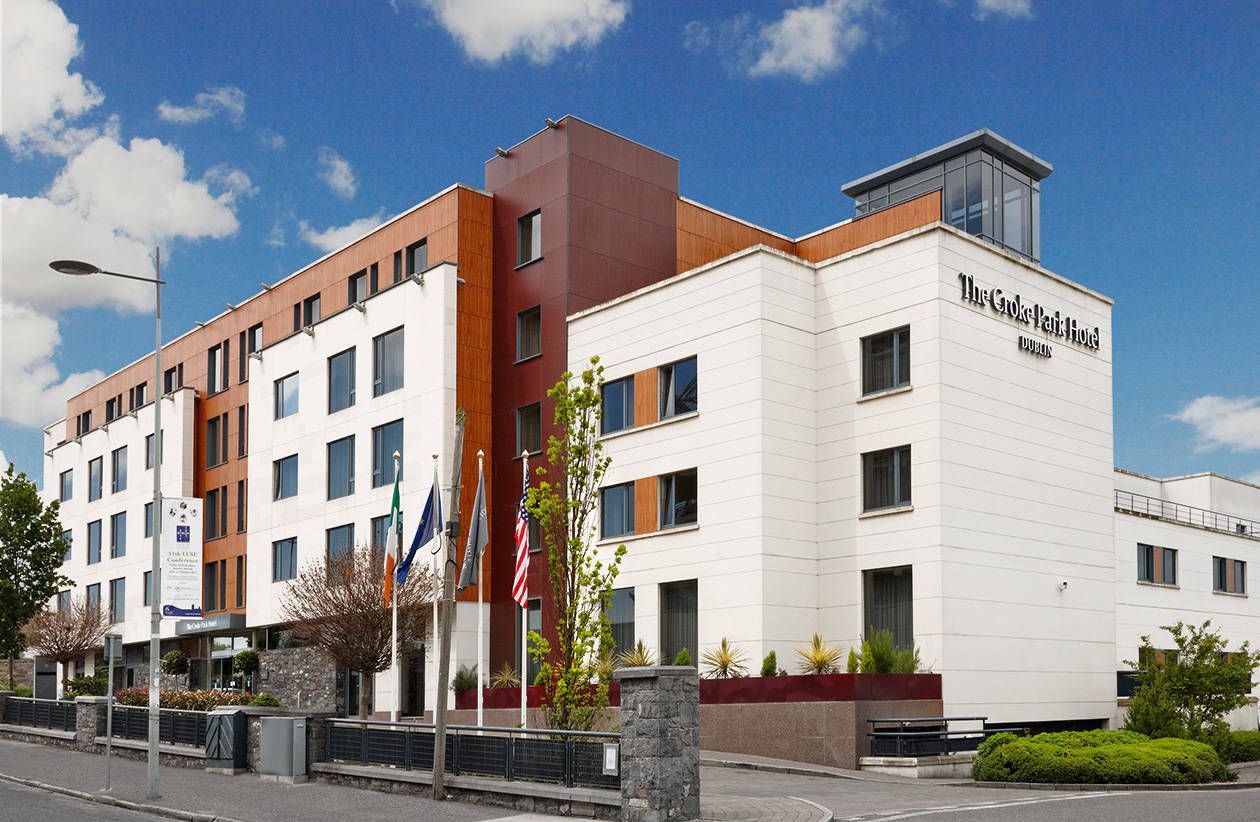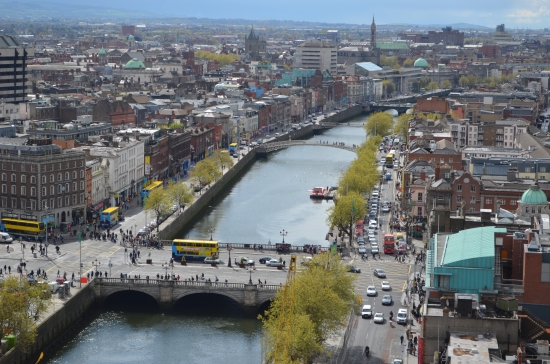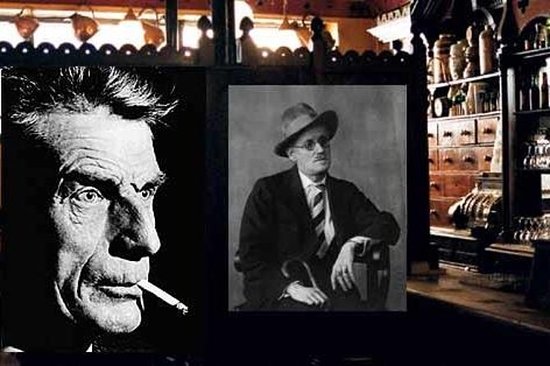The Croke Park Hotel
Conference Room: Clonliffe
Jones’s Road, Dublin 3
D03 E5Y8, IrelandConference Agenda
- June 28, 2019
- 08:30 - 09:00Registration (Registration Desk)
- 09:00 - 09:45Welcome and Opening Remarks / Opening Workshop: Researching Identities Today
- 09:45 - 10:30Keynote Address: Branislav Radeljić (University of East London, UK): Identity, Immigration and the Rise of Populism in Europe
- 10:30 - 11:00Coffee Break & Snacks
- 11:00 - 13:00Panel 1: Politics of Identity: National vs. Post-National Identity Making in Europe, Nationalism and the Making of Otherness
- 13:00 - 14:30Irish Specialties Lunch – Restaurant
- 14:30 - 16:30Panel 2: Thinking Identities Today: The Self, Personal Identity, Autonomy and Belonging
- 16:30 - 17:00Coffee Break & Snacks
- 17:00 - 19:00Panel 3: (En)Gendering Identities: Gendered Identities as Social Constructs and Narrations of Lived Experiences and Visual Practices of Politicization
- 19:00 - 20:30Optional Social Dinner Out in Dublin
- June 29, 2019
- 09:00 - 10:00Keynote Address: Jennifer Todd (University College Dublin, Ireland): Identity Change after Conflict: Morals from the Irish Cases
- 10:00 - 10:30Coffee Break & Snacks
- 10:30 - 13:00Panel 4: Critical Theory and Intellectual History Readings of Narrative and Performative Identity Making Practices
- 13:00 - 14:30Irish Specialties Lunch – Restaurant
- 14:30 - 16:30Panel 5: Art, History and Identity Making: The Role of Visual Narratives and Artistic Representations in Shaping Identities
- 16:30 - 17:00Coffee Break & Snacks
- 17:00 - 19:00Panel 6: Visual Signifiers, Signs and Symbolic Determinants of Cultural Identitarian Production from Community and Alterity Making to National History and Politics
- 19:00 - 19:30Closing Session: Concluding Remarks and Discussions
- 19:30 - 21:00Optional Social Dinner Out in Dublin
- June 28, 2019
Identities and Identifications: Politicized Uses of Collective Identities (8th Edition)

- Conference Description
- Participant’s Profile
- Registration and Fee
- Social Activities and Publication
- Important Dates
- Venue and Directions
- Conference Program
- Keynote Address
- Panel 1
- Panel 2
- Panel 3
- Keynote Address
- Panel 4
- Panel 5
- Panel 6
The 8th Euroacademia International Conference
Identities and Identifications
Politicized Uses of Collective Identities
28 – 29 June 2019
4* The Croke Park Hotel
Dublin, Ireland
Keynote Address:
Branislav Radeljić (University of East London, UK)
Identity, Immigration and the Rise of Populism in Europe
Keynote Address:
Jennifer Todd (University College Dublin, Ireland)
Identity Change after Conflict: Morals from the Irish Cases
Conference Description
Identity is one of the crown jewelries in the kingdom of ‘contested concepts’. Few concepts are so integral to social assumptions, beliefs and claims of belonging while simultaneously escaping a clear definition or even a minimal consensus. The idea of identity is conceived to provide some unity and recognition while it also exists by separation and differentiation. From personal to group and collective identities, multiple layers of identifications juxtapose, conflict or exclude. Few concepts were used as much as identity for contradictory purposes. From the fragile individual identities as self-solidifying frameworks, to layered in-group identifications in families, orders, organizations, religions, ethnic groups, regions, nation-states, supra-national entities or any other social entities, the idea of identity always shows up in the core of debates and makes everything either too dangerously simple or too complicated. Constructivist and de-constructivist strategies have led to the same result: the eternal return of the topic. Some say we should drop the concept, some say we should keep it and refine it, some say we should look at it in a dynamic fashion while some say it’s the reason behind the resistance to change. In the meantime, identities are programmatically asserted and promoted to generate cohesion and demand recognition while the process of identification excludes and creates boundaries and alterity making practices.
If identities are socially constructed and not genuine formations, they still hold some responsibility for inclusion/exclusion – self/other nexuses. Looking at identities in a research oriented manner provides explanatory tools for a wide variety of events and social dynamics. Identities reflect the complex nature of human societies and generate reasonable comprehension for processes that cannot be explained by tracing pure rational driven pursuit of interests. The feelings of attachment, belonging, recognition, the processes of values’ formation and norms integration, the logics of appropriateness generated in social organizations, are all factors relying on a certain type of identity or identification. Multiple identifications overlap, interact, include or exclude, conflict or enhance cooperation. Identities create boundaries and borders; define the in-group and the out-group, the similar and the excluded, the friend and the threatening, the insider and the ‘other’. Even more, identities generate legitimating circumstances for social and political action; assert the power of naming and rules of belonging while setting the stage for the perception of the other. The other can be internal, as difference and incomplete coherence with the in-group, or external as acknowledged difference or even in cases of radical alterity as perceived threat. The formation of identities can lead to multicultural integration of diversity, tolerance, recognition and pluralism while simultaneously exclude and build walls.
Beyond their dynamic fuzzy nature that escapes exhaustive explanations, identities are effective instruments for the politicization of social life. The construction of social structures and of specific social practices together with their imaginary significations, requires all the time an essentialist or non-essentialist legitimating act of belonging; a social glue that extracts its cohesive function from the identification of the in-group. Identities are political. Multicultural values populate extensively the twenty-first century, yet the distance between the ideal and the real multiculturalism persists while the virtues of inclusion coexist with the adversity of exclusion. Dealing with the identities means to integrate contestation into contestation until potentially a ‘n’ degree of contestation. Due to the confusion between identities and identifications, some scholars demanded that the concept of identity shall be abandoned. Identitarian issues turned out to be efficient tools for politicization of a ‘constraining dissensus’ while universalizing terms included in the making of the identities usually tend or intend to obscure the localized origins of any identitarian project. Identities are most often advanced as intentional concepts: they don’t say anything about their sphere but rather defining the sphere makes explicit the aim of their usage. It is not ‘identity of’ but ‘identity to’.
The 8th Euroacademia International Conference ‘Identities and Identifications: Politicized Uses of Collective Identities’ aims to scrutinize the state of the art in collective identities research, to bring once more into debate the processes of identity making, identity building in both constructivist or de-constructivist dimensions. The conference will include a wide variety of contributions on identity making practices while fostering a critical assessment of intended or unintended consequences that lead to the politicization of identities. It is the aim of the Euroacademia conference to open the floor to dynamic multi-dimensional and inter-disciplinary understandings of identities in their historic formation or in the way they shape the present and future of organizations or communities. The conference however seeks also to integrate and address the misunderstandings or misconceptions implicit to identity formation practices. A focal place will be given to methodological refinement and innovation in the research of identities in a broad spectrum of disciplines.
Euroacademia aims to bring together a wide network of intellectuals, academics, researchers, practitioners and activists that are willing to share and open to debate their research on identity related topics. Disciplinary, trans and inter-disciplinary approaches, methodological assessments, innovations and recommendations, single case studies or cross-sectional analyses, reflective essays, experience sharing or works addressing new puzzles are all welcomed.
Participant’s Profile
The conference is addressed to academics, researchers and professionals with a particular interest related to the topic of collective identities from all parts of the world. Senior and junior researchers are equally welcomed. As the nature of the conference is intended to be multidisciplinary in nature, different academic backgrounds are welcomed and the event aims to foster multi-disciplinary dialogue and inter-disciplines interaction.
Post-graduate students, doctoral candidates and young researchers are welcomed to submit an abstract. Representatives of INGOs, NGOs, Think Tanks and activists willing to present their work or projects with impact on or influenced by specific understandings of identities are welcomed as well to submit abstracts of their contributions.
Abstracts will be reviewed and the participants are selected based on the proven quality of the abstract. The submitted paper for the conference proceedings is expected to be in accordance with the lines provided in the submitted abstract.
Registration and Fee
The Registration Process in Now Closed
The Participation Fee Includes:
- the registration fee
- official invitation
- participant’s package with all the materials for the conference
- eligibility for publishing the presentation in the conference follow-up publications
- access to Euroacademia discussion group and newsletters
- 2 daily coffee brakes with snacks during the conference
- refreshing drinks in the conference room for the duration of the event
- an Irish specialties lunch on 28th of June 2019 at the 4* Croke Parh Hotels’s Restaurant
- an Irish specialties lunch on 29th of June 2019 4* Croke Parh Hotels’s Restaurant
- certificate of attendance
- access to optional social program
Unfortunately, Euroacademia has no available funds for covering transport and accommodation to/in Dublin. Participants are responsible for securing funding to cover transportation and accommodation costs during the whole period of the conference. Official invitation letters can be sent by Euroacademia to the financing institution to confirm the selection and participation in the conference upon request.
Social Activities and Publication
A specific spot in the conference program will be dedicated to social networking and therefore all the participants interested in setting or developing further cooperation agendas and prospects with other participants will have time to present and/or promote their project and express calls for cooperation.
A specific setting (Social Corner) for promotional materials connected with the topic of the conference will be reserved for the use of the participants. Books authored or edited by the participants can be exhibited and promoted during the whole period of the conference and can also be presented within the conference package based on prior request and arrangements.
Photos and videos will be taken during the conference and the organizers will consider through the participation of selected presenters or members of the audience that the agreement for being photographed or filmed during the event was granted through registration to the event. Please notify the organizers in written form prior to the the event if you are a confirmed participant and would prefer otherwise.
An optional dinner and as social event will be organized for the first and second evening of the conference in a typical Irish cuisine restaurant as optional program for the willing participants. The social dinner will be held based on participant’s prior confirmation and it will be covered by the participants individually at the restaurant.
Publication:
Selected papers will be eligible for publishing in thematic volumes or published in an electronic volume with ISBN after the confirmation of the authors and a double peer-review process based on an agreed publication schedule after the conference. All the papers selected for publication should be original and must have not been previously published elsewhere.
Important Dates
| Important Dates | |
|---|---|
| 10th of May 2019 | Deadline for Submitting Panel Proposals |
| 24th of May 2019 | Deadline for Paper Proposals: 300 words abstracts and details of affiliation |
| 25th of May 2019 | Latest notification of acceptance |
| 29th of May 2019 | Sending the Registration Form |
| 5th of June 2019 | Payment of the conference fee |
| 15th of June 2019 | Sending the draft paper to be uploaded on the web site of the conference (optional) |
| 18th of June 2019 | Publication of the conference program and uploading the draft papers on the website |
| 28th of June 2019 | The conference commences at 9.00 am |
Venue and Directions
The proceedings of the conference will take place in the The Clonliffe Auditorium of the exclusive 4* The Croke Park Hotel in Dublin. The Croke Park Hotel is located only minutes from Dublin city centre and offers one of the best 4-star services to be found in Dublin. A tangible passion for providing excellent service makes The Croke Park Hotel to be consistently featured within the Top 5 of traveler’s choices in Dublin. The hotel enjoys a unique convenient location just minutes from the city centre and all of its attractions and just steps away from the historic and world-famous Croke Park Stadium, the spiritual home of Ireland’s native Gaelic games and one of the city’s leading venues for headline concerts.
The Croke Park Hotel
Jones’s Road, Dublin 3, D03 E5Y8, Ireland
https://www.doylecollection.com/hotels/the-croke-park-hotel
Dublin, capital of the Republic of Ireland, is on Ireland’s east coast at the mouth of the River Liffey. Dublin is a vibrant city with a distinct energy that combines a youthful spirit and a rich historic cultural heritage. The city of Oscar Wilde, James Joyce and Samuel Beckett, Dublin is a UNESCO city of literature. It has a unique cultural flavor coming from the urban combination of classical Georgian squares and terraces and narrow cobbled streets spread around in a dynamic contemporary European capital that fosters arts, creativity, education together with innovation, business development and an efficient urban infrastructure. Dublin is well known for the open spirit and friendliness of its people and also for the amazing pubs and bars serving the world famous Guinness beer and Irish whiskies. A contemporary booming urban center, Dublin is also a city of contemporary popular culture famous for names like Riverdance, Sinead O’Connor, Colin Farrell or U2. From Trinity College to the Dublin Bay, with its harbors, cliff walks, and wide skies, Dublin has all the ingredients for an excellent experience.
Getting to Dublin is a breeze. Dublin Airport is one of the busiest in Europe, with hundreds of daily flights providing a huge range of options to get here. Direct flights are available from most major cities in the UK and continental Europe, several hubs in North America. Connecting hubs hook up with further flights from all over the world, providing for easy access to the Irish capital. Dublin Airport is 10km from the city. It’s located close to the M50 and M1 motorways, and a range of transport options connect directly with the city centre and suburbs. Aircoach, Airlink and Dublin Bus provide bus services from both terminals, and metered taxis are also readily available
HERE
Conference participants are fully responsible for arranging the accommodation and travel to Dublin.
Conference Program
The Conference Agenda is available in the right sidebar of this page.
The extensive conference program with abstracts and available draft papers is accessible below by clicking on the panel number or section tabs and links of individual presentations.
Keynote Address:
Branislav Radeljić (University of East London, UK)
Identity, Immigration and the Rise of Populism in Europe
Identity, Immigration and the Rise of Populism in Europe
Abstract:
Since the beginning of the European integrationist project, many have viewed the question of immigration as a challenge to European identity and overall unity. As such, European otherness, and primarily the presence of Muslims in Western Europe, continues to encourage debates regarding the capacity of immigrants to integrate and become part of the mainstream society. This is even more accentuated in times of economic and political crises, with representatives of both the Left and Right trying to revamp their agendas and secure additional votes. As we have witnessed, the rise of populism has placed immigration and European identity at the forefront of policy-making considerations, with a clear preference for the intergovernmental approach to the EU. At the same time, current scepticism has put the glorified notions of European tolerance and solidarity to the test.
Biographical Note:
Branislav Radeljić is Associate Professor of International Relations at the University of East London, with expertise in European Union, East European and Western Balkan politics. He has held visiting fellowships at the London School of Economics and Political Science, University of California at Berkeley, University of Illinois at Urbana – Champaign, University of Michigan and University of Pittsburgh. Professor Radeljić has presented his research findings at numerous conferences and workshops, and has regularly been invited to give talks and provide commentary to different media outlets. Outside academia, on an occasional basis, he conducts research and supplies consultancy services within his area of expertise.
Politics of Identity: National vs. Post-National Identity Making in Europe, Nationalism and the Making of Otherness
- The EU and Its Sub-Self Others: The Struggle Against Disintegration in the Context of the ‘Migration Crisis’The application of Foucauldian discourse analysis to the institutions´ migration discourse(s) since 2011 renders visible the EU´s triangle of modern subject formation practices vis-à-vis ´the migrants` and the Member States. It provides evidence against the assumption of a permanently resolved, unproblematically hierarchized and uncontested layering of already fully constituted, separate and distinct identities of the EU and the Member States and thus against the underlying premature categorization of the EU as post-modern/post-Westphalian. In terms of EU integration theory, the findings furthermore point to a renewed relevance of the classical Mitrany problem.Julia Simon, Helmut Schmidt University, Hamburg, Germany
- ‘A Torn Country’: Deconstructing the Debates Surrounding the Turkish Accession to European Union through the Prism of the Myth of ‘The Clash Of Civilizations’ (2002-2005)Within a geopolitical context marked by an increased instrumentalization of religious and ethnical factors in the understanding of world affairs, my goal is to understand how press articles construct the current events of EU when it is confronted with a country which profoundly challenges its identity. In that respect, the main paradigms referred to by two internationally diffused European newspapers: Le Monde and The Guardian will be deconstructed. Based on the theory developed by Chiara Bottici and Benoît Challand in their book, The Myth of the Clash of Civilizations (2010), my hypothesis is that this event of the European integration is constructed by the press, in symbiosis with the European Union’s representatives, as a readapted variant of the political myth constituted by the thesis of Samuel P. Huntington.Marine Pierre, University of Geneva, Switzerland
- National vs European Identity in the Preparation for the European Parliamentary ElectionsThe European identity presuppose loyalty to the European institutions that express the interest of the Union. Member States – especially the recently joined – still insist on strengthening their national identities in the hope of get more political credits at home. Widening the Union’s competence is considered a direct danger to the power of the populist national governments in some countries in Eastern Europe. Instead of perceiving the supranational nature of the Union as a facilitation, these governments use “Europe” a major threat for their power. This study argues that the policy of the populist government in Hungary represents a battle between national and European identity.Ildikó Éva Gelencsér, O. P. Jindal Global University, School of International Affairs, Haryana, India
Thinking Identities Today: The Self, Personal Identity, Autonomy and Belonging
- Empire as ‘Una Persona’: Politicizing the Unity of the Person in Seneca’s De ClementiaSeneca argues that the unity of the state relies on the unity of the prince, while the unity of the prince means that the prince has a coherent and unified psychological state. The conflicted internal identities of a single person will result in the separation of the whole state. De Clementia is one of the earliest attempts in the European intellectual history to politicize the personal identity for the sake of the unity of the whole Europe. By examining how Seneca intertwines the two senses of identity in the body metaphor in De Clementia, this paper aims to provide the modern readers a historical perspective to understand the relationship between personal identity and political unity.Kaicheng Fang, Faculty of Classics, Cambridge University, UK
- Me & Mine: Personal Identity and Property: A Tangled WebFirst, one of the reasons why we care about personal identity is because it settles property issues. But at the same time, what makes me the same person as the one who painted it is that the memory of painting it is rightfully mine. Thus sameness of self settles property but sameness of self presupposes a notion of property (whereby my body and my memories belong to me). Is this a vicious circle? Furthermore, the fission issue also raises thorny property issues: if both B and C equally lay claim to being A, then how do they settle which of them gets which of his items of property? I will argue that personal identity may actually be more of a legal/normative concept and less a subject to be settled by the metaphysicians than debate since Locke has suggested.Simon Cushing, University of Michigan-Flint, USA
- How to Resist Demonization of Identities? A Philosophical Reading of the Recognition of the Indian Muslim IdentityI argue that in the context of Indian Muslims, what is to be recognized is not merely the exotic Taylorian difference of an identity but the dynamic differencing historical human process that makes the disparate identity-continuum the way it is. The ontological force of the argument aside, I will establish that homogenizing and essentializing the differences within an identity-constellation is a strategy of oppressors to make of a people a ‘demonized other’, thus forcing the victim to internalize and live by that monstrous self-image. Identities are not prison houses of the self, but liquid continuums within which happens self-making, and which, in turn, are shaped by the self’s everyday doings.Nisar Alungal Chungath, Department of Humanities and Social Sciences, IIT Bombay, India
- Autonomy, Independence, the Self and IdentityThe paper will address the dynamics of conceiving identity in relation with the self, starting from the Kantian principial view on autonomy to contemporary placements of autonomy in relation with historicity, finitude and alterity making practices inherent to the making of the self within a social `genetic soup` (J.Olsen) and in the boundaries of social imaginary institutions (C. Castoriadis).Emanuel Crudu, Euroacademia (Paris, Lucca & Brussels)
(En)Gendering Identities: Gendered Identities as Social Constructs and Narrations of Lived Experiences and Visual Practices of Politicization
- The Fight to End Violence Against Women and the Construction of a Feminist EuropeI explore how emotional processes – namely, the practices of feminist anger – have forged a "feminist Europe" identity which states are pressured to adopt or run the risk of exclusion. Constructing an epistemic worth of subjects, forming the economies in which they operate, shaping collective subjectivities, and framing public policy, I will show that VAW campaigns have helped legitimize and institutionalize gender-specific lived experiences of emotion (such as feminist anger) within European governance structures, even generating a professional gender-specific expertise for identifying diverse and multidimensional forms of suffering and injustice.Michele Greer, Université de Paris 8, France
- How are Iranian Gay Men Coping with Systematic Suppression Under Islamic Law? A Qualitative StudyThe aim of this study is to use a qualitative approach to gain a more in-depth understanding of the coping strategies adopted by gay men living in Iran under systematic suppression based on each individual’s subjective experiences, feelings, intention, and beliefs. A semi-structured interview in Farsi (Persian) language was used to gather the qualitative data. Twenty-three men who identified themselves as gay and who currently live in Iran were interviewed for this study. Transcripts of the interviews were subjected to analysis using thematic analysis.Mohammadrasool Yadegarfard, University of Bedfordshire, UK
- Women’s Political Visualisation of Post-conflict BelfastO’Dowd and Komarova (2013: 528) outline difficulties encountered when ‘theorising’ the city. Belfast, in Northern Ireland, they suggest, has been viewed as exemplar ‘conflict’ or ‘contested’ city, or one that it is ‘divided by deep-rooted ethno-national conflict.’ In late 2014, a group of women who live in the predominantly Protestant Tiger’s Bay and predominantly Catholic New Lodge ‘interface’ areas of North Belfast, worked cooperatively to produce a visual representation of their localities as a means of highlighting political issues affecting the post-conflict city. This visualisation took the form of a photobook containing images taken and edited by the women themselves.Jolene Mairs Dyer, Ulster University, Northern Ireland, UK
- Image, Identity and Activism: A Study of the Campaign to Repeal the 8th Amendment to the Constitution in Order to Secure Abortion Rights for Women in IrelandThis paper provides a semiotic analysis of a range of images used in the campaign. The paper considers the meaning of the images, in the campaign and in Irish society and culture. The paper considers the politicisation of the images used. The analysis examines the effectiveness both of the images used in the campaign and the effective use of images in the campaign. The paper sheds light on the use of the visual in the development of a cohesive collective identity for the campaign. Finally, the paper considers the utility of the campaign and the lessons learned in the campaign while proposing the campaign as a model or case study for similar campaigns globally.Christina Quinlan, De Montfort University, Leicester, UK
Keynote Address:
Jennifer Todd (University College Dublin, Ireland)
Identity Change after Conflict: Morals from the Irish Cases
Identity Change after Conflict: Morals from the Irish Cases
Abstract:
How do identities change away from division and opposition? My recent indepth qualitative interview study of identity change in both parts of Ireland came up with surprising results. First, change was widespread. In the early 2000s half of respondents evidenced significant or major change, and a full two thirds in Northern Ireland, twice as many as in the South. Second, it was not primarily a change away from nationalism to cosmopolitanism but a change in the form and meaning of nationalism. Third, it was less an embrace of overarching identities (European, Northern Irish) than an opening out of existing ones to wider (cross community, cultural, European) interaction. Fourth, everyday change was systematically marginalised or reversed in Northern Ireland – where by the 2010s polarization had again increased – and accelerated in the Republic of Ireland – where the very meaning of the nation changes with the recent referenda. This shows the importance of the everyday level of identity change as a precondition of wider change and the importance of everyday interaction in generating it. It also shows the vulnerability of everyday change to systematic social and cultural traps – particularly common in Northern Ireland. In these cases the real cultural problems in fostering change in closed and divisive boundaries and identities didn’t lie in a sense of nationality (which proved malleable) but rather in a close identity-tie with the state and the wrong constitutional and public signposts for change. In many respects the Irish cases are atypical. But they challenge our intuitive sense that the sense of ‘nationalism’ or ‘national identity’ is at the root of right-wing populist politics It may rather be an ontological dependence on a particular form of state-ness, that can be translated into a sort of nationalist identity politics. It raises important questions as to the political and cultural policies at state and European level that can foster greater transformation.
Biographical Note:
Jennifer Todd is Professor of Politics at UCD, Member of the Royal Irish Academy, former Director of the Institute for British Irish Studies at UCD, Fellow of Geary Institute at UCD, Fellow of Centre for the Study of Constitutional Change, University of Edinburgh, UN Global Expert, and member of the advisory board of a number of projects, including the Northern Ireland Peace Monitoring Project. She gained her degrees in philosophy from University of Kent at Canterbury (BA) and Boston University (PhD). The focus of her work, from early analyses of aesthetics and politics to current work on conflict and settlement, state change and identity shift, has been on the interrelation of socio-economic and political processes and processes of cultural change. She has extensive publications, individually and jointly, on ethnicity, identity, conflict and Northern Ireland: the most important include her 1996 Cambridge UP Dynamics of Conflict in Northern Ireland, and her studies of ethnicity and identity. She publishes in a range of journals from West European Politics to Theory and Society, from European Journal of Sociology to Political Studies, from Political Psychology to Nations and Nationalism and many more. Her recent externally funded collective research projects have generated two major data sets – on state elite understandings of the Northern Ireland peace process, and on everyday identity change in each part of Ireland in the 2000s. Jennifer Todd is the author of Identity Change after Conflict: Ethnicity, Boundaries and Belonging in the two Irelands, Palgrave Studies in Compromise after Conflict, Palgrave Macmillan, 2018.
Critical Theory and Intellectual History Readings of Narrative and Performative Identity Making Practices
- Writing History is Making History, or How to Roll Back a Revolution or Two: Naked Among Wolves (1958; 1963; 2015) and the New EuropeThe more charged a history, the higher the stakes. Reverberating the East like no other historical space, the history of Buchenwald needed to be rewritten for that bit of former Eastern bloc to fit into the ‘Heart of Europe’, or rather: into the ‘heart of a neoliberalist Europe.’ Yet, by the same token, rewriting the history of Buchenwald is also rewriting the legacy of the former East and, with it, the history of (the Other) Europe—a making of history that needs to be reflected as such.Evelyn Preuss, Yale University, USA
- Identity Politics in the Village of Ostrów: Manipulating Monolinguals to Augment AutochthonicityA savvy campaign of cultural brokerage organized 300,000 autochthonous Opole Silesians in southwestern Poland into “the German Minority in Poland” within months of the 1989 transition. Leadership tapped deep feelings of belonging and alienation while also using community tri-lingualism to selectively present Silesian identity to monolingual speakers of German – journalists, politicians, donors. Over the course of one celebratory day in one village, identity was politicized onstage, in the audience, and in the woods where the day began with prayer and remembrance that turned into a revelatory argument.Elizabeth R. Vann, Independent Writer/Researcher, Brockton, USA
- Locating the Self through Representing the Other: Occidentalism as a Strategy for Self-exclusion and Recognition in Mohja Kahf’s The Girl in the Tangerine ScarfTaking Mohja Kahf’s novel The Girl in the Tangerine Scarf (2006) as a sample of Arab American literature, this paper tends to both examine and discuss the extent to which Arab American characters including Téta, Wajdy, and Khadra represent and identify white Americans from an Occidentalist point of view to exclude themselves from wider American society, and sustain their self-realization and recognition. The arguments and analysis in this paper are outlined within social identity theoretical framework based on Henry Tajfel and Homi Bhabha’s perspectives and Gayatri Spivaks’ postcolonial concept of the subaltern.Ishak Berrebbah, Coventry University, UK
- Loss of Loved Ones and IdentificationLoss of loved ones and identification find expression in D.H. Lawrence's American writings in the form of replacement which becomes a routine habitual compensation for the loss of love-objects. Psychologically, human beings color aspects of their relation to the world outside them. Thus; they defamilliarize the affair to fill the void, replacing other(s) for the lost love-object. According to Freud, "the most obvious reaction is to identify oneself with it, to replace it from within, as it were, by identification." (Freud, 193)Aylin Bayrakceken Akin, Atilim University, Ankara, Turkey
Art, History and Identity Making: Visual Narratives and Artistic Representations of Identity
- Between Deeds and Dreams: Identity as Phantasm (A Case Study in Diasporic Identities)A static figure of the Jew was explicitly targeted as the paradigm of “difference.” Modigliani’s and Chagall’s contrasting bodies of work reflected their diverse formations in the worlds of Ashkenaz and Sepharad, thus revealing the fluidity of Jewish identity and imploding any temptation towards essentialism. Specifically, I show how Chagall’s Jew series (ca. 1911-15) destabilized fixed Jewish stereotypes via color and form. In contrast, Modigliani’s early, racialized portraits gave way to an eradication of race altogether in his later portraiture (c. 1916-19). This utopian gesture emerged from his Italian-Sephardic heritage. Both artists’ work approached prevailing visual culture from marginalized Jewish perspectives, and addressed salient issues facing an otherwise multifaceted people scattered throughout the world. Their imagery directly countered the ethno-centrism and anti-Semitism that, coursing through Post-Dreyfus France, would have widespread and devastating consequences on Jews and other fringe populations throughout Europe in the decades to come.Maryclaire Koch, University at Buffalo Art Department, New York, USA
- A Name in a Network: Constructions and Dissolutions of Identity in the Work of Philippe ThomasThe proposed talk will analyze Thomas’s project in the context of his socio-historical environment. Influenced by artists such as Richard Prince, Cindy Sherman, John Knight or Sherrie Levine, Thomas’s works often display the art world networks in which he aimed to inscribe himself. By looking at some of his activities in Paris and in New York, I will draft out misunderstandings and non-alignments between the French and American scenes, from readings of so-called French theory to queer activism. As I will argue, Thomas’s performance of non-identity is always aware of the impossibility to fully disappear as an author. The lecture analyzes this interplay and asks about the connections between Western art world centrisms, network imperatives and the queer play with artistic identity.Hanna Magauer, Universität der Künste, Berlin, Germany
- Fluidity of Identity Built through Muscles: Between Sport and Artistic CreationThe main focus of this proposal lies in shattering the gender stereotype by means of the body modification carried out through bodybuilding, being critical of the suffocating regulations that these bodies have to meet when they are assessed on stage. We will focus on the context of art through female artists or transgender artists who have used this discipline to modify their bodies, and by doing so, have managed to give a stronger message than in the field of competition. Some of them will be Cassils (Canada-USA), Francesca Steele (UK), and the author of this proposal, Isa Fontbona (Spain).Isabel Fontbona Mola, Theories of Contemporary Art Group, Universitat de Girona, Spain
IN PROCESS OF UPLOAD
Visual Signifiers, Signs and Symbolic Determinants of Cultural Identitarian Production from Community and Alterity Making to National History and Politics
- Populist America: What Objects Reveal about US Identitarian FormationsBy interrogating the logic of identity formations through visual and material cultures in political processes will I explore the relevance of visual and object design in everyday American cultural life as part of ongoing political processes beyond formal exercises such as voting. I suggest that Visual Design has the capacity to objectify the metaphysics of identitarian formations, to materialize in cultural objects —images— a not-yet fully constituted community of political actors like voters and rally participants.Oliver Arellano-Padilla, Parsons School of Design / University Of Massachusetts, USA
- Politicising the Saint: Far Right and the Appropriation of National SaintsThis paper seeks to examine the ongoing process of politicising National Saints by far-right groups. Through linking the historical past of saints, specifically those that figure prominently within the identities of countries, far-right groups have sought to co-op the actions and values of individual saints and religion into a form of self-ideology. This has given rise to an intrinsic linking of far right, particularly anti-immigration, and chauvinistic policy with that of well known figures of public and national pride. These connections have given legitimacy to the far-right, through the linking of religious, canonised bodies being accepted as embodying the policies and beliefs of the right.Charlotte Mears, Kingston University, UK
- Stop Signs and Cross-Roads: Barriers Faced by Multiethnic and First Generation Students in Higher EducationWhen multi-ethnic and/or first-generation students attempt to navigate campus spaces they are often met with academic and social barriers that prevent them from finding a sense of belonging on campus, which is integral in healthy identity development. By using an intersectionality approach to look at the intersection of multiethnic and first-generation identities, I argue that the barriers these students face are compounded, an instance not exclusive to these particular identities. I also argue that previous solutions in addressing these inequities are not sufficient and university administrators have a responsibility to recognize the role that they have in shaping identity spaces on campus for all students that facilitate healthy identity development.Alexandria Persaud, University of Pennsylvania, USA
- The Construction of Modern Greek Identity in the Nineteenth CenturyWithin this framework, this paper analyzes the construction of the modern Greek identity in the nineteenth century. By examining the tension between the two mutually opposed forces in the cultural and linguistic realms, the paper aims to illustrate how dualism shaped the whole of Greek life. Furthermore, the Greek state had to formulate and develop a national identity for its nation. Religious differentiation of the Greeks from the Muslims could no longer cultivate the Greekness of the Greeks adequately. However, as Greek peasants designated themselves as Christians and speakers of Greek, the new nation-state had to transform this religious identity into a secular national identity.Pınar Şenışık Özdabak, Department of International Relations, Doğuş University, Turkey



































